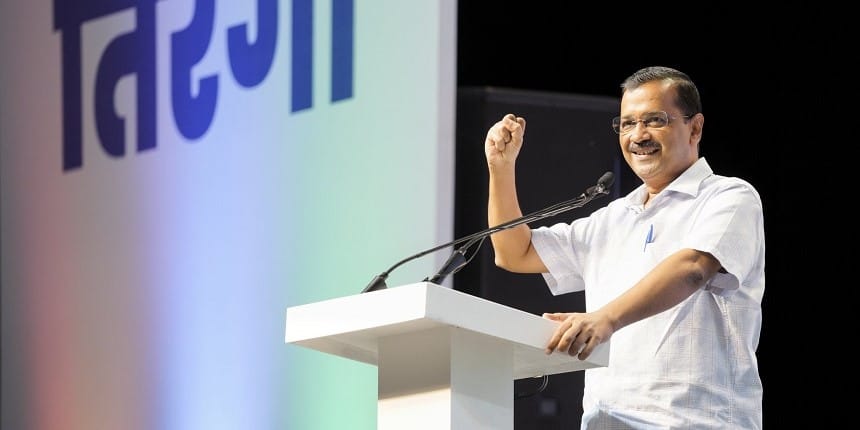Arvind Kejriwal's Resignation: A Political Gambit or a Fight for Principles?
Just days after securing bail from the Supreme Court in a high-profile corruption case, Kejriwal stated that he would step down immediately

In a move that has left Delhi’s political landscape in a state of flux, Arvind Kejriwal, the fiery chief minister of Delhi and national convenor of the Aam Aadmi Party (AAP), has announced his resignation. Just days after securing bail from the Supreme Court in a high-profile corruption case, Kejriwal stated that he would step down immediately, demanding early elections and pledging to return only if the people of Delhi reaffirm his integrity through their votes.
A Calculated Gamble or Genuine Conviction?
Kejriwal’s resignation, following his release from Tihar Jail where he was held on charges related to Delhi’s now-scrapped liquor policy, has been portrayed by his supporters as a bold stand for democratic principles. “I will not return to the Chief Minister's chair until the people of Delhi certify my honesty,” he declared, calling for the Delhi Assembly elections to be moved up to November, alongside Maharashtra's elections, rather than the planned date of February 2025.
The resignation appears to be a calculated gamble, leveraging public sentiment while attempting to seize the narrative in what is shaping up to be a fiercely contested political showdown. Senior AAP insiders reveal that Kejriwal made the decision during a series of closed-door meetings with top party leaders. His statement, combined with the exclusion of trusted lieutenant Manish Sisodia from the Chief Ministerial race, has left political analysts speculating on Kejriwal's next steps.
Opposition Criticism and Political Calculations
Critics, particularly from the Bharatiya Janata Party (BJP), have been quick to dismiss Kejriwal’s resignation as a “political stunt.” BJP MP Bansuri Swaraj labeled the move a "U-turn," accusing Kejriwal of attempting to avoid further scrutiny under the guise of moral responsibility. Meanwhile, Congress leader Sandeep Dikshit claimed the resignation was driven by compulsion rather than principle, suggesting it was an attempt to preempt deeper investigations that could arise under a new government leadership.
Kejriwal’s resignation comes at a time when he has been vocally critical of Prime Minister Narendra Modi’s government, accusing it of using state institutions to target political opponents. “This is not just about me. They have gone after Chief Ministers across the country—Mamata Banerjee, Pinarayi Vijayan, Siddaramaiah. The aim is to suppress all voices of dissent,” Kejriwal argued, positioning himself as a defender of democratic norms against what he describes as an increasingly authoritarian central government.
Choosing a Successor: AAP’s Leadership Dilemma
With Kejriwal stepping down, AAP faces the immediate challenge of appointing a new leader. While Kejriwal has ruled out Manish Sisodia, a key strategist and former deputy chief minister, from taking up the mantle, the party is now looking for a leader who can navigate the turbulent political waters ahead. Senior leaders like Saurabh Bharadwaj and Atishi are among those considered potential successors, but the party has yet to announce a final decision.
The choice of the next Chief Minister will be crucial for AAP's strategy, both in the short term—managing Delhi’s governance until the elections—and in the long term, determining the party's ability to withstand opposition pressure. The new leader will need to maintain party unity, articulate AAP’s position on key issues, and manage the fallout from Kejriwal’s legal troubles.
A Battle for Public Sentiment
Kejriwal’s decision to step down also appears to be a strategic attempt to frame the upcoming elections as a referendum on his leadership and integrity. By putting his fate directly into the hands of voters, he seeks to rally public support and portray himself as a victim of political persecution. However, this approach is not without risks. The move may backfire if the opposition successfully paints it as an act of desperation rather than a principled stand.
AAP, which emerged from the anti-corruption movement of the early 2010s, finds itself once again at a crossroads. The party, which gained rapid popularity for its promises of clean governance and transparent policies, now faces allegations that threaten its very foundation. Kejriwal’s resignation and call for early elections reflect a tactical pivot—an attempt to regain lost ground and reassert control over the political narrative.
The Road Ahead: Uncertain and Unpredictable
As Delhi prepares for what could be an accelerated election campaign, the city’s political climate remains uncertain. The AAP, under its new leadership, will need to swiftly regroup and craft a compelling message that resonates with voters. Meanwhile, Kejriwal’s future hangs in the balance, with both his political survival and the credibility of his party at stake.
Ultimately, Kejriwal's resignation may either reinforce his image as a maverick leader who stands against corruption or be perceived as a strategic retreat in the face of mounting legal and political challenges. The next few weeks will reveal whether this is a masterstroke of political strategy or the beginning of a deeper crisis for AAP and its embattled leader.





